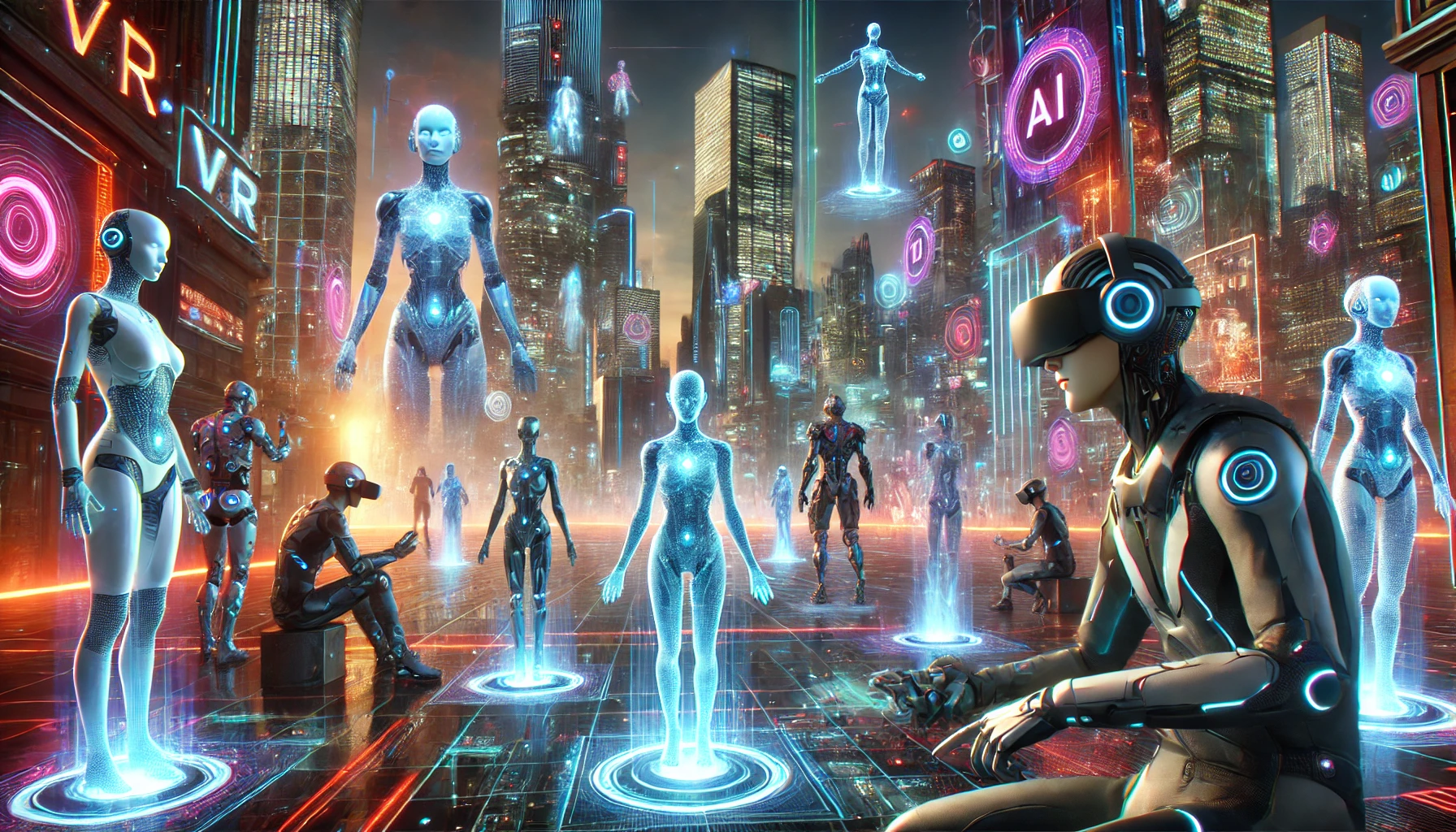The combination of virtual reality (VR) and artificial intelligence (AI) has opened up new dimensions in interactive and immersive experiences. By leveraging AI, virtual worlds have become more dynamic and responsive, offering users an unparalleled sense of immersion. In this article, we’ll explore how Virtual Reality AI Roleplays are transforming gaming, training, and other industries, making virtual environments smarter and more engaging.
Understanding Virtual Reality and AI
Before diving into virtual reality AI roleplays, let’s first explore the two technologies behind this revolution: VR and AI.
What is Virtual Reality?
Virtual reality is a computer-generated environment that simulates physical presence in real or imagined worlds. Through the use of VR headsets and controllers, users can interact with 3D environments in a way that feels real. Applications of VR include gaming, entertainment, education, and simulations where users can explore new worlds or train in lifelike scenarios.
What is Artificial Intelligence?
Artificial Intelligence (AI) involves the simulation of human intelligence processes by machines, particularly computers. Key AI technologies like machine learning, natural language processing (NLP), and deep learning allow machines to learn from experience, make decisions, and perform tasks that would typically require human intervention. In the context of VR, AI helps to create intelligent virtual characters, adapt environments, and generate dynamic content.
Merging VR and AI
When combined, VR and AI create immersive experiences that go beyond simple simulations. AI enhances VR by introducing interactive, intelligent environments and characters that respond to user actions in real time, adding a layer of unpredictability and complexity that traditional VR lacks.
What Are AI Roleplays in Virtual Reality?
Definition of AI Roleplays
AI roleplays in VR refer to scenarios where virtual characters (NPCs) powered by AI engage with users in realistic, story-driven experiences. These roleplays simulate interactions with characters in a world that adapts based on decisions made by the user.
Key Features of AI Roleplays in VR
- Dynamic Storytelling: AI adjusts the plot and events in real time based on user decisions.
- Intelligent Characters: Non-playable characters (NPCs) exhibit human-like behaviors, responding to user input with emotion, logic, and reasoning.
- Immersive Environments: Virtual worlds adapt and change according to user actions, creating unique experiences every time.
Use Cases of AI Roleplays in VR
- Gaming: Popular in open-world RPGs, AI-driven roleplays create richer, more interactive experiences, where characters remember past events and change their behaviors accordingly.
- Training Simulations: AI roleplays are used in medical, military, and corporate training, simulating real-world situations where professionals can practice their responses.
- Social Experiences: VR offers AI-driven companions, where users can engage with lifelike characters in social or therapeutic settings.
How AI Brings Virtual Worlds to Life
AI adds depth and interactivity to VR experiences, making the virtual world feel more alive and responsive.
Real-Time Decision Making
AI-powered NPCs don’t follow scripted responses. Instead, they make decisions in real time based on the environment and user interactions, creating a more dynamic experience. Whether it’s a character in a game or a training simulation, their behavior feels more unpredictable and realistic.
Personalized User Experience
AI adapts content based on user behavior, making the experience unique for each person. For instance, if a user consistently chooses to act aggressively in a VR game, the AI may generate more hostile NPCs or storylines tailored to that choice.
Natural Language Processing (NLP)
With NLP, AI allows users to converse with virtual characters in a way that feels like interacting with a real person. This technology is pivotal for roleplaying games and training simulations, where communication is key to the experience.
AI-Driven Visuals and Physics
AI improves the visuals and physics of VR worlds. It can generate realistic animations, textures, and environmental changes, ensuring that every interaction is smooth and lifelike.
Adaptive Storytelling
One of the most powerful aspects of AI roleplays is adaptive storytelling. AI changes the narrative based on the user’s actions, creating a personalized journey that evolves dynamically.

Real-World Applications of Virtual Reality AI Roleplays
The integration of AI roleplays in VR isn’t just confined to entertainment. Here are some of the most significant applications:
Gaming and Entertainment
Games like Skyrim VR use mods to enhance AI, creating NPCs that respond in complex ways, and altering the story based on player choices. As VR gaming evolves, virtual reality AI roleplays will continue to play a crucial role in creating more engaging and lifelike experiences.
Education and Training
AI roleplays in VR are transforming the way we train professionals. For example, medical students can practice surgeries with AI-powered patients that simulate real-life scenarios, while military personnel can engage in AI-driven combat simulations.
Virtual Therapy and Mental Health
AI-driven roleplays are becoming a tool in therapy and mental health, where patients engage with AI companions to work through anxiety, depression, and other conditions in a safe, controlled virtual environment.
Business and Corporate Training
In business, AI roleplays can help employees practice customer service, sales, and leadership skills by simulating interactions with realistic AI characters in virtual scenarios.
Challenges of Integrating AI in VR Roleplays
While the potential for virtual reality AI roleplays is vast, there are challenges to overcome.
Technical Limitations
Developing AI-driven VR worlds requires substantial computational power and advanced hardware. VR headsets must be capable of delivering high-quality visuals and real-time interaction, which can be a barrier to entry for many users.
Cost and Accessibility
The development of AI-powered VR experiences can be expensive, limiting their availability to larger organizations or developers with substantial resources.
Ethical Concerns
As AI grows more sophisticated, there are ethical questions surrounding data collection, privacy, and the realism of AI-driven characters. Ensuring that virtual characters respect user boundaries is essential.
AI Unpredictability
While AI’s ability to adapt in real time is a strength, it can also introduce unpredictability that might frustrate users. Striking the right balance between AI autonomy and user control is crucial.
The Future of AI Roleplays in Virtual Reality
As technology advances, the future of Virtual reality AI roleplays looks promising.
Advancements in AI and VR Technologies
With continuous progress in machine learning, natural language processing, and VR hardware, the future holds even more immersive and realistic virtual worlds powered by AI.
Expanding Beyond Gaming
In addition to gaming, AI-driven roleplays in VR will soon expand to industries like healthcare, education, and corporate training, offering entirely new ways to learn and engage with content.
The Promise of Fully Immersive Worlds
The ultimate vision for virtual reality AI roleplays is fully immersive worlds where every character, environment, and story is dynamically generated to respond to the user’s actions and preferences, creating a truly personalized experience.
Conclusion
Virtual reality AI roleplays are transforming the way we interact with digital environments. By combining the immersive power of VR with the intelligence of AI, these technologies create experiences that feel dynamic, personalized, and incredibly lifelike. As AI continues to evolve, the possibilities for immersive roleplaying scenarios in VR are limitless, offering exciting opportunities for entertainment, education, and beyond.
Explore the world of virtual reality AI roleplays and discover how these innovations are shaping the future of digital interaction.
FAQs
1. What is the role of AI in virtual reality?
AI enhances VR by making virtual environments more responsive and dynamic. It allows NPCs to react in real time, creates personalized experiences, and drives interactive storytelling.
2. Can I experience AI-driven roleplays in VR gaming?
Yes! Many VR games, like Skyrim VR, use AI to create complex characters and adapt the storyline based on your actions, enhancing the immersion.
3. How does AI-powered VR benefit training simulations?
AI roleplays in VR allow trainees to engage with intelligent virtual characters in lifelike scenarios, offering a safe space to practice decision-making without real-world consequences.
4. Are AI-driven VR experiences expensive?
Yes, AI-powered VR experiences often require advanced hardware and significant development resources, making them more costly than traditional VR.
5. What are the future trends in AI roleplays in VR?
In the future, AI roleplays will become even more immersive, with AI characters and environments adapting in real time to create fully personalized, interactive worlds.





Thanks for sharing. I read many of your blog posts, cool, your blog is very good.
Thank you so much! We’re glad you enjoy reading our posts and really appreciate your kind words and support.